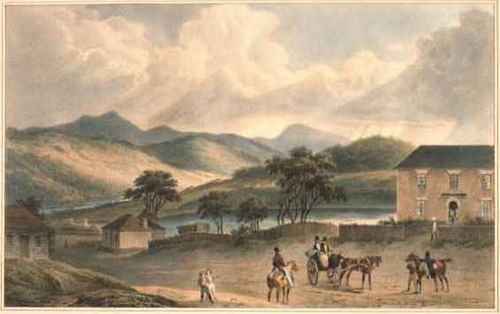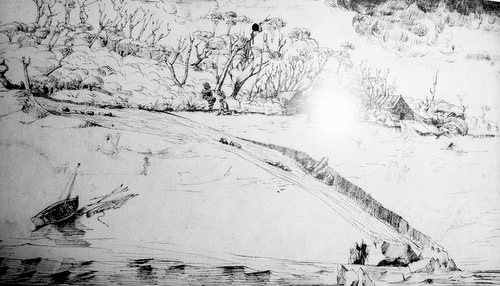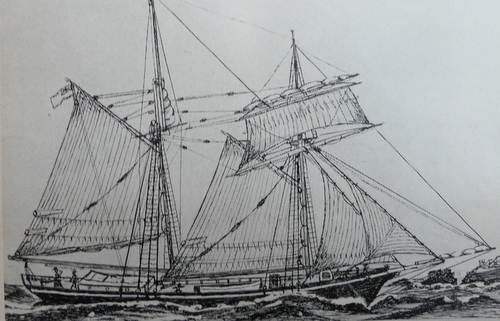
4.2. The Henty Family......a settlement at Portland
I felt like a true blue sailor now. It was a lot better than tending sheep at Cormiston. Mr. Edward Henty was now my employer. Land at last!
"I can just see it," I shouted out loudly, and pointed with an arm..
"Where! where?" Mr. Edward shouted back.
My legs were firmly braced in the middle of the bow, and an arm was wrapped around a stay that ran to part of the bowsprit. The Thistle was flinging itself forward, then plunging its bows into the sea, and cork screwing wildly, flinging spray everywhere.
Yes I could see Mr. Dutton's small house in the trees, and the sheds of the Whaling Station belonging to Mr. Reed. The whaleboat was on the beach. The sheds had been built originally to store curing seal skins and oil, but with the decline in seals for slaughter killing whales for oil was taking over. The whale oil barrels were stored in the sheds. I think Mr. James bought the sheds and other items from Mr. Reed so the family could also take up whaling.
Possibly an early Henty establishment at Portland Bay.
" Aha, I see it," shouted Mr. Edward. " As usual you have the best eyes on the boat. I had better go and see what Captain Liddle intends to do now."
We had used the ebb tide, sailed, rowed and poled the Thistle down the Tamar River from Launceston. Past George Town and into Bass Straight. The wind was from the south west, so after Circular Head, and Three Hummock Island to our left, we sailed a course towards Cape Otway, passing King Island and other small Islands on our left.
In a direct line from Launceston to Portland bay, it is about four hundred miles, but it took us thirty four days before we arrived. The second day after we left the heads of the Tamar, we were within about five miles of the bay. From then on the weather deteriorated and blew us back and forth from shelter to shelter between island for days. We even went ashore on some islands and pulled grass for the animals.
It had taken several weeks to load up the Thistle. I slept aboard so that I could help the Captain and crew place all the stores around the boat to keep it balanced, and at the same time remove ballast as the boat got heavier. The servants from the farm and Mr. James merchant store would arrive every day with more and more items for the settlement.
I know we took onboard two thousand five hundred bricks, because I was mostly responsible for taking them off the wharf and placing them around the boat. It went on and on. Casks of beef and pork, bags of flour, tea, potatoes, oats and wheat. Nails and many lengths of timber for house and barn construction. Grape cuttings, boxes of plants, bales of clothing. One whaleboat, a keg of tobacco for the whaling men at the Bay.
A bullock tray, one plough and harrow. Six working bullocks, twenty heifers, two cows, two bulls and five pigs plus dogs and rabbits. During sheltering from the gales we lost a few animals, but when we got there most were happy enough to swim for the shore when we chucked them in.
The Captain reduced sailing speed, as we got closer to the mainland, and the Thistle started to wallow and roll heavily. It had on board , most of the items necessary to establish a home and property at this place called Portland. From servants and labourers, to live stock including many sheep, to household items and food.
John Batman's "Rebecca" similar to the "Thistle.".
This was the second time I had sailed this part of the route to Portland Bay on the Thistle.
How did all this come to pass?
Our family finally arrived at Cormiston, where my Dad immediately started looking after the flocks of sheep and the other farm animals. I was able to show Mr. Thomsen that I was a capable shepherd, so he allowed me to move the sheep around and quite often stay overnight in the paddocks with them. I soon got to know the property very well. Where the water sources and creeks located, and where the good usable stands of native trees and bushes grew. Where the hilly bits and rocky bits were. Where the grass was good or poor. Where the fence lines were. Where the 300 acres of cultivated land for wheat was, and also the 5 acres for fruit and vegetable growth was.
There were also 25 working bullocks, 150 cattle, 40 of which were milking cows.
Mr. Thomsen had a very large house. a detached kitchen, a servants room, wash house, dairy and stables. A large barn,granary and house for the farm servants.
Quite often I would drive the dray cart into Launceston. Sometimes taking Mr. Thomsen, when he choose not to ride his horse, or taking some servants into town with produce to sell or to purchase items required at the property
On these trips I learnt that some one of the Henty family had arrived at Launceston, and was setting up a Trading Store very close to the wharf. Other members of his family, Mr. Thomas Henty, the famous English sheep breeder were expected soon..This was the man my father knew of, and would dearly like to meet and to discuss his knowledge of sheep.
As it turned out Mr. Thomsen and wife had to return to Scotland to settle some family affairs, and Cormiston with all its facilities was for rent for a couple of years. When Mr. Thomas Henty arrived, his sons James and Stephen showed him Cormiston. They decided to take up the rent and settle in. However, they did so knowing they would have to obtain more land for themselves to own. That would be difficult because now the Government was not giving land away free anymore. Good land was also getting scarcer in this part of Van Diemans Land.
That was why we were to look at land across the Straight that had not been settled by the Government.
This was the second time I had sailed this part of the route to Portland Bay on the Thistle.
I remember my selection for the first voyage accompanying Mr. Thomas Henty, the Father, and one of his seven sons, Mr. Edward.
I was working some sheep, checking their feet, in a straight close railed small sheep pen. Mr. Henty, Mr. Edward, Mr. Frances and Mr. James were looking on.
"Well Sam, " Mr. Henty, spoke out so that all could hear. " You have demonstrated your ability and knowledge of sheep handling, and other farm animals. You have also passed on your knowledge of Cormiston's 2000 acres, to us all, particularly, young Francis. For that I thank you."
"Thank you Sir," I answered. Quite often young Mr. Frances, who was about five years older than me, would stay out all night looking after the sheep. Keeping the wild animals away. also the local thieves..

A Tasmanian Tiger.
"I would like you to accompany Edward and myself on a voyage on one of our ships, the Thistle, to a place called Portland, which is across the Straight, on the southwestern coast of New South Wales. We are going to see if it is worthy of our settling our Family there. Mr. Dutton who lives there during the whaling season thinks very highly of it. We are also going to explore the recently recorded proposed new settlement sight at a place called St. Vincent's Gulf."
"Then we are going to proceed further westward to Fremantle and the Swan River settlement at Perth. there I will inspect our settlement holdings, and also see my other son John, who is managing the property for us. Young Francis must stay here and look after his Mother and this property, with your Father and the others."
"He will be able to get extra assistance from his older brother James who lives in Launceston. We should be away about three months. How does that sound."
"I would like that very much Sir. I hope I do well."
As it turned out we were away for five months. We also brought back several hundred seal skins that were bought at King Georges Sound.Mr. Stephen turned up for a visit in another Henty ship the Fanny. That visit delayed our departure from the Sound.

Early Tamar Valley scene.
.
Previous Chapter | Chapter Selection | Next Chapter | Download Chapter

